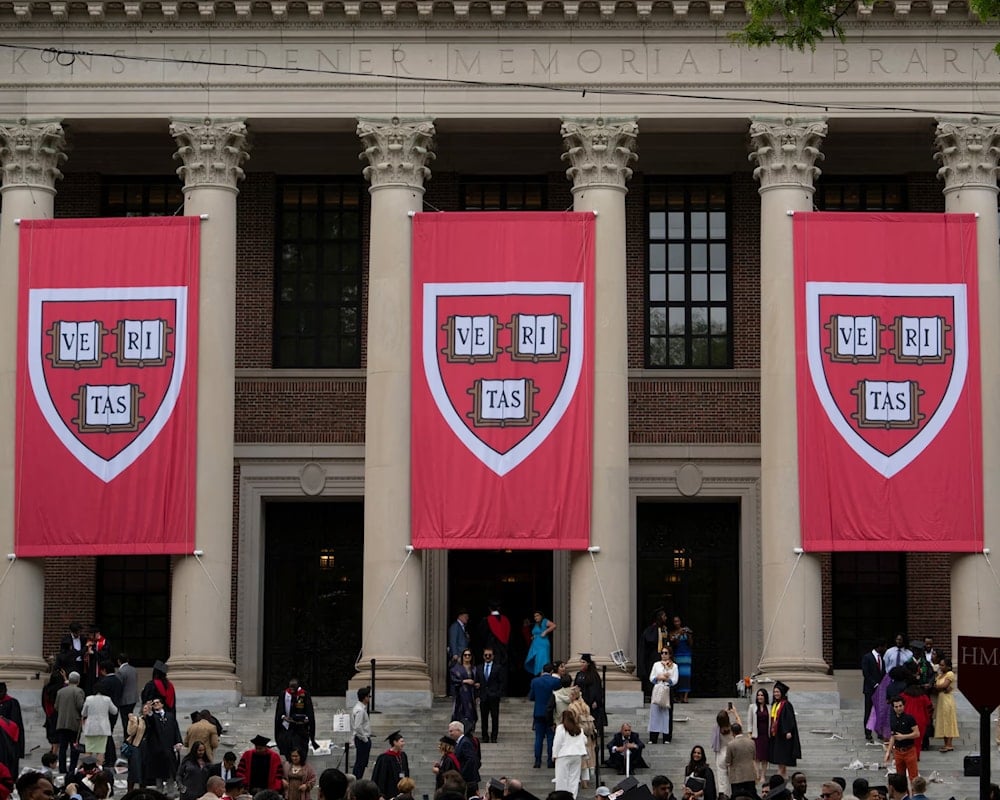FT: Harvard seeks help for students hit by Trump visa crackdown
Harvard explores relocating international students after Trump’s visa clampdown blocks admissions, sparking fears and contingency plans across US campuses, according to The Financial Times.
-

The Widener library during Harvard’s 374th commencement in Cambridge, Massachusetts, on 29 May 2025 (Rick Friedman/AFP)
According to The Financial Times, Harvard University is actively exploring relocation options for international students affected by the Trump administration’s visa restrictions, as part of a growing response by academic institutions to a crackdown on foreign student admissions.
University leaders from institutions such as the University of Chicago and the London Business School have held talks with Harvard on the possibility of temporarily hosting students who may be denied visas due to the Trump visa crackdown on international students.
Other US universities are also developing plans to relocate incoming and current foreign students to campuses abroad if the clampdown persists, reports The Financial Times.
The Trump administration recently blocked Harvard from accepting foreign students, citing alleged liberal bias and "antisemitism" on American campuses.
On the other hand, protests on Harvard campuses have been ongoing since the October 7 Al-Aqsa Flood, condemning "Israel" for genocidal war crimes in Gaza, and demanding an arms embargo.
Although a judge has temporarily frozen the order, the White House has continued tightening visa scrutiny, suspending new applications and intensifying background checks, including social media reviews.
According to The Financial Times, some foreign students have already had their visas revoked or been detained, particularly those alleged to have participated in protests critical of "Israel" and its war on the Gaza Strip.
This policy shift has triggered widespread concern among universities, especially those that rely heavily on the tuition revenue from the more than 1.1 million international students in the US, many of whom come from China and India.
Foreign students face delays, fear, and legal uncertainty
Harvard launched fresh legal action last week to block Trump’s latest measures, and President Alan Garber confirmed the institution is developing contingency plans to ensure international students and scholars can continue their work during the summer and the upcoming academic year, according to The Financial Times.
The impact of the visa ban has been felt nationwide. Suzanne Rivera, president of Macalester College in Minneapolis, which hosts a significant international student population, said her institution has created new internships and launched fundraising campaigns to support students who choose not to leave the US for the summer due to fears they won’t be able to return, even with valid visas.
“The fear is widespread for the international students among us,” Rivera said. “Our concern right now is that these policy shifts may erect obstacles that would prevent students returning to campus or new ones from matriculating,” as reported by The Financial Times.
Economic and academic fallout from Trump visa ban grows
The visa crackdown on international students could have major economic implications. The US Department of Commerce estimates foreign students contribute around $45 billion annually to the economy.
According to The Financial Times, NAFSA, an international education organization, condemned the administration’s moves as “an unacceptable assault on an already thorough screening and monitoring process” that creates fear and uncertainty.
Amit Sevak, CEO of ETS, which administers a major English-language proficiency exam used for US university applications, told The Financial Times that the organization had seen a double-digit decline in test applications.
“What’s happening right now with the fall semester just around the corner is that some international students may withdraw, delay or switch to applications elsewhere,” Sevak said, warning that the true impact may be felt in 2026.
Some universities, including New York University, Northeastern, and Hult, are considering reallocating students to their overseas campuses to avoid delays.
Several institutions with international branches, including in Qatar, may follow suit, according to The Financial Times.
Still, academic leaders have raised concerns about consistency in curriculum and credit recognition when transferring students to partner institutions.
Grant Cornwell, president of Rollins College in Florida, emphasized that the loss would extend beyond economics. “Those perspectives bring enrichment to the classroom that speaks directly to our mission: have students learn with and from people who see the world differently,” as reported by The Financial Times.
As legal battles continue and the fall semester approaches, US universities are preparing for prolonged uncertainty in international education under Trump’s evolving campus policy agenda.

 4 Min Read
4 Min Read








